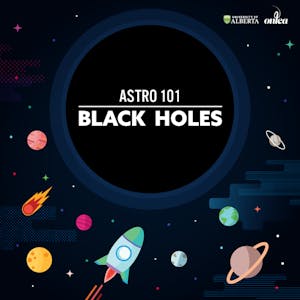Astro 101 Black Holes
What is a black hole? Do they really exist? How do they form? How are they relatedto stars? What would happen if you fell into one? How do you see a black hole if they
emit no light? What’s the difference between a black hole and a really dark star?
Could a particle accelerator create a black hole? Can a black hole also be a worm
hole or a time machine?
In Astro 101: Black Holes, you will explore the concepts behind black holes. Using the theme of black holes, you will learn the basic ideas of astronomy, relativity, and quantum physics.
After completing this course, you will be able to:
• Describe the essential properties of black holes.
• Explain recent black hole research using plain language and appropriate analogies.
• Compare black holes in popular culture to modern physics to distinguish science fact from science fiction.
• Describe the application of fundamental physical concepts including gravity, special and general relativity, and quantum mechanics to reported scientific observations.
• Recognize different types of stars and distinguish which stars can potentially become black holes.
• Differentiate types of black holes and classify each type as observed or theoretical.
• Characterize formation theories associated with each type of black hole.
• Identify different ways of detecting black holes, and appropriate technologies associated with each detection method.
• Summarize the puzzles facing black hole researchers in modern science.
None
Syllabus
Syllabus - What you will learn from this course
Week 1
Introduction to Black Holes
Week 2
Life and Death of a Star
Week 3
The Structure of Spacetime
Week 4
Sizing Up Black Holes
Week 5
Approaching a Black Hole
Week 6
Crossing the Event Horizon
Week 7
Inside a Black Hole
Week 8
Hunting for Black Holes
Week 9
Our Eyes in the Skies
Week 10
Riding the Gravity Wave
FAQ
When will I have access to the lectures and assignments?
Access to lectures and assignments depends on your type of enrollment. If you take a course in audit mode, you will be able to see most course materials for free. To access graded assignments and to earn a Certificate, you will need to purchase the Certificate experience, during or after your audit. If you don't see the audit option:
The course may not offer an audit option. You can try a Free Trial instead, or apply for Financial Aid.
The course may offer 'Full Course, No Certificate' instead. This option lets you see all course materials, submit required assessments, and get a final grade. This also means that you will not be able to purchase a Certificate experience.
What will I get if I purchase the Certificate?
When you purchase a Certificate you get access to all course materials, including graded assignments. Upon completing the course, your electronic Certificate will be added to your Accomplishments page - from there, you can print your Certificate or add it to your LinkedIn profile. If you only want to read and view the course content, you can audit the course for free.
Is financial aid available?
Yes. In select learning programs, you can apply for financial aid or a scholarship if you can’t afford the enrollment fee. If fin aid or scholarship is available for your learning program selection, you’ll find a link to apply on the description page.
Reviews
Super course...there are many informations about black holes are presented. and their communication language was easily understand to all..thank you so much for offer the course
Great course, I thoroughly enjoyed it and learned a lot. The graphics and illustrations were fun and informative, and I also enjoyed the food scenes - helped stick it in my memory. Thanks much!
Astro 101 Black Holes, was the first coursera lesson I took. I loved it.
I'm hooked and already signed up for my next course.
I purchased my certificate and will display it proudly.
Its been quite an illuminating ride, could have done with more data-driven mathematics but nevertheless, a highly recommendable introductory course for further cultivating curiosities.
